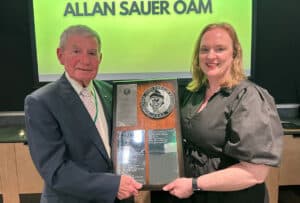
Jonathan Clarke
18 July 2024
Humanity might significantly expand its presence across the solar system this century, both in person and via robot emissaries. This raises questions about a Christian approach to space exploration. Fellow of ISCAST (Christianity and science in conversation) and president of Mars Society Australia, Jonathan Clarke, explores C.S. Lewis’s writings on this topic and their relevance to modern space exploration.
We are experiencing a surge in human activity in space. Investment in space exploration and settlement by governments, institutions, companies, and private organisations has increased exponentially over the past 50 years. Robotic spacecraft have travelled beyond Pluto, Earth orbit is a hub of profitable commerce, astrobiology is now a respected discipline, and interest in moon and Mars settlements has grown among billionaires and private groups.
But should there be limits to our exploration? With questions around the ethics of mining asteroids and lunar rare earth minerals, ever-increasing amounts of human-produced space junk orbiting our planet, and the recent dilemma of astronauts stuck on the International Space Station after technical difficulties, it’s important to consider our responsibilities as stewards of creation – even beyond Earth.
God’s quarantine?
Clive Staples Lewis was one of the first Christian writers of the 20th century to engage with the subject of space exploration. He was an avid reader of the science fiction of the period and wrote several science fiction novels and short stories of his own.
While he was fascinated by space travel’s allure and excitement, Lewis was appalled by some of the attitudes towards space exploration portrayed by other science fiction writers at the time. In his novel Voyage to Venus (1943), he criticised those “obsessed with the idea … that humanity, having now sufficiently corrupted the planet where it arose, must at all costs contrive to seed itself over a larger area: that the vast astronomical distances which are God’s quarantine regulations, must somehow be overcome”.
He developed this theme further in Religion and Rocketry (1958), writing: “Man destroys or enslaves every species he can. Civilised man murders, enslaves, cheats, and corrupts savage man. Even inanimate nature he turns into dust bowls and slag-heaps. There are individuals who don’t. But they are not the sort who are likely to be our pioneers in space. Our ambassador to new worlds will be the needy and greedy adventurer or the ruthless technical expert.”
Read more: Earth as astronauts see it set to hang in St Paul’s
Less well known is his caveat, given in an interview in Decision Magazine only two months before his death: “I look forward with horror to contact with the other inhabited planets, if there are such. We would only transport to them all of our sin and our acquisitiveness, and establish a new colonialism. I can’t bear to think of it. But if we on Earth were to get right with God, of course, all would be changed. Once we find ourselves spiritually awakened, we can go to outer space and take the good things with us.”
However, this could be seen as a rather narrow view of space exploration and its potential benefits to humanity—if done responsibly.
Space exploration is an extension of the creation mandate through technological advance, just as maritime technologies brought new islands and continents into human habitation
Exploring God’s creation
Since Lewis’s death in 1963, space exploration has been carried out by the usual mixture of sinner and saint. What would Lewis have made of the Apollo program, a product of the Cold War but featuring the reading of Genesis 1 from lunar orbit, or Apollo landing on the moon “in peace for all Mankind”?
Lewis seemingly fails to recognise that one can support space exploration and settlement while objecting to their misuse. Arthur C. Clarke called Lewis one of the “most dangerous enemies of Astronautics” for the views expressed in Voyage to Venus. Nonetheless, in response to R. L. Farnsworth, who advocated that the United States claim the moon as its own territory in the first step to building an interplanetary empire, Clarke confessed he was “forced to agree” with Lewis. He wrote: “the ‘quarantine’ will have to remain in force for a few more centuries yet if many advocates of interplanetary travel think as Mr. Farnsworth appears to do”.
Lewis also ignored the idea that space exploration might be driven by scientific curiosity exploring God’s creation and a legitimate theatre of human endeavour. No matter how misused and abused, the creation mandate (Genesis 1:28) still stands; humanity remains instructed to fill the habitable space, use it as a gift, and is accountable to God for its stewardship. While ancient worldviews had no concept of humans venturing beyond Earth as they knew it, we should now consider how this verse applies with our more contemporary understandings of space travel. Space exploration and utilisation is an extension of the creation mandate through technological advance, just as maritime technologies brought new islands and continents into human habitation.
Read more: If we discovered life on other planets, what would that mean for Christianity?
Lewis does not seem to have considered the role of governance over the conduct of space travel. Space exploration and utilisation does not occur in a legal vacuum, but is formally regulated and guided by agreements such as the Outer Space Treaty (1967) and the Artemis Protocols (2020). These show that space exploration need not become a lawless frontier dominated by the needy, greedy, and ruthless, but an arena where all parties desire rules and guidelines for conduct.
Finally, Lewis, who had little exposure to human accounts of space flight, did not consider the “overview effect” – the awe, wonder, and spiritual awareness experienced when gaining a cosmic perspective, even if only for a few minutes.
A Christian theology for space exploration
Awareness is growing about how to live sustainably and protect the environment here on Earth, influencing how we might think about space exploration. Lawyers, philosophers, ethicists, scientists, and engineers alike are exploring how to balance human expansion into the solar system with preserving nature.
Christians knowledgeable in aerospace engineering, planetary science, resource economics, space law, and creation theology have an opportunity to take advantage of these conversations and make an informed impact on the future of space travel. They might develop:
- A creation theology that moves from an earth-centric to a solar system-centric perspective.
- Suggested solutions for the physical, engineering, biological, and economic constraints of space settlements, resource utilisation, and terraforming.
- A theological basis for preserving common off-Earth resources.
- A theological basis for accessing the benefits from space settlements, resource utilisation, and terraforming for those on and off Earth.
- A theological economy for protection of basic human values and access services in small, enclosed, and isolated communities in hostile environments where basic life support—air, water, temperature, pressure—are all manufactured and controlled commodities.
These are the challenges that will face Christians as we expand our presence beyond Earth. Who will rise to meet them?
Geologist and former ISCAST director Dr Jonathan Clarke has had a lifelong interest in space exploration and planetary science. He and his wife attend St Matthew’s Church in Canberra.
For more faith news, follow The Melbourne Anglican on Facebook, Instagram, or subscribe to our weekly emails.






